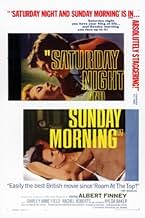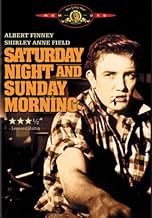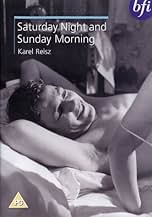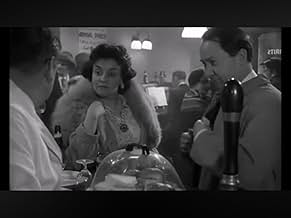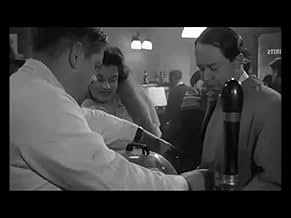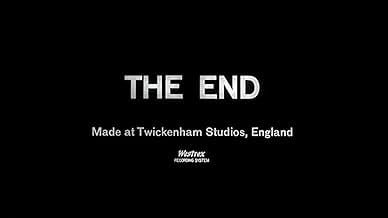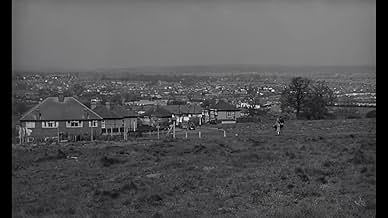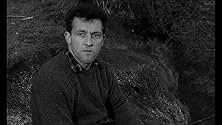A rebellious, hard-living factory worker juggles relationships with two women, one of whom is married to another man but pregnant with his child.A rebellious, hard-living factory worker juggles relationships with two women, one of whom is married to another man but pregnant with his child.A rebellious, hard-living factory worker juggles relationships with two women, one of whom is married to another man but pregnant with his child.
- Won 3 BAFTA Awards
- 10 wins & 3 nominations total
- Mrs. Seaton
- (as Elsie Wagstaffe)
- Loudmouth
- (as Colin Blakeley)
Featured reviews
The thing that deserves the most praise, however, is Sillitoe's script, which puts virtually all modern dramatic screenplays to shame. In a general way, the working class british films of the late 50s and 60s launched the tradition that leads to Loach, Leigh, Tim Roth, etc. This film's subtlety and ambivalence towards its leading character reminds me specifically of Mike Leigh at his very best.
Albert Finney as the surly Seaton is uncomfortably excellent. His bitter tone and attitude cuts like a power saw. Sooner or later his arrogance will be rewarded and you can't wait. He does display a tender side occasionally with Brenda the married woman but the softness is soon washed away as he rails against the system and his predicament. He is also a world class beer drinker which makes him even more unpleasant as he insults pub patrons and takes a nasty fall down a flight of stairs, only to lie there smiling. Pain is a major source of his existence and rowdy nights out like this serve in a perverse way to blunt it.
Director Karel Reisz moves the storyline along at a rapid pace capturing the grim existence of row house living and deafening factory work. It is a world of gray skies and defeated characters trying to make the best of what they have. They are not the "Happy Breed" of generations past.
Made in the first year of the tumultuous decade that changed the world forever Night is pretty tame by today's standards. But in it's day it was condemned by the Catholic Church for its blatant immorality. One might venture that it had an influence on John Lennon who wrote "Working Class Hero" and on many occasions was witnessed to act like the unctuous Seaton in his life. It might also be argued that Seaton was a prototype for the futuristic angry young man Alex the Droog in Clockwork Orange.
Betty Ann Field, Hylda Baker and Norman Rossington make up a convincing supporting cast in ably assisting Reisz in the world he depicts. Rachel Roberts is outstanding as the tragic Brenda. Smitten with Arthur and doomed by her predicament she perfectly conveys her situation with a tawdry lack of glamor.
Saturday Night and Sunday Morning may be an unpleasant film but it is a powerful and important one.
Today some will be puzzled by the dilemmas and themes to the point of "so what?"
Writer Alan Silitoe (from his own novel) quickly draws us in the to real world of a Nottingham factory worker. This is not the factory work of normal movies with the made-up hero having a blob of black stage paint across his forehead; more the dishevelled, sweaty, badly lit world that he knows from first hand experience.
In it we find Finney, smoking and gruff at his lathe. No actor, before him or after has ever made so much of an impression in a mundane situation as the ex-Shakespearen actor does here. Reality comes out of every pore. His matter-of-fact speaking voice, as a voice-over narrator, should not be underrated either - like someone giving testimony partly against their will.
His world of is one of petite rebellion and cheap thrills. The "fighting pit prop that wants a pint of beer." He is immoral and the wife of a friend is seen as fair game: Although the consequences are beyond his immature mind.
There is good supporting performances from British character actors such as Norman Rossington and Hylda Baker, but this movie belongs to one man and one man alone: Sir Albert Finney.
Twenty five years after he is dead the cinematic world is going to wake up and realize how brilliant an actor this man was: Like they did with Humphrey Bogart
This film was considered quite shocking at the time of its release because of its frank sexual situations and the freely-discussed topic of abortion. These themes aren't shocking anymore, but one reason for that is the introduction of them in films like this. Shot in black and white, it gives the viewer a picture of life in a bleak factory town, portrayed very realistically by director Karl Reisz. The actors are these people, they're not merely playing them. This is especially true of Finney, who sports a low-class accent and epitomizes the "angry young man" so prevalent in the late '50s. Finney's performance as a young man who takes out his work-week aggression on women, booze and mischief, is as revolutionary as Dean's or Brando's was in American cinema.
Finney is ably backed up by the supporting actors. Roberts is very effective as Brenda, a housewife married to a dull man, and Shirley Anne Field even dressed down is gorgeous as the ingénue who wins Arthur's heart and makes him look at the future. One wonders if he'll ever grow up sufficiently. She's going to have her hands full.
The dialect is very authentic and difficult to understand at times - I actually used my closed captioning. The dialect adds to the whole atmosphere of "Saturday Night and Sunday Morning," another of the rebel movies but in a class all by itself.
Did you know
- TriviaThe factory scenes were filmed in the same factory that original author Alan Sillitoe worked in during the war when he was making shells and other artillery. At the time of filming, the factory was owned by the Raleigh bicycle company.
- GoofsWhen Arthur and Doreen meet for the first time, her packets of crisps on the counter disappear and reappear between shots.
- Quotes
Arthur Seaton: Mam called me barmy when I told her I fell of a gasometer for a bet. But I'm not barmy, I'm a fighting pit prop that wants a pint of beer, that's me. But if any knowing bastard says that's me I'll tell them I'm a dynamite dealer waiting to blow the factory to kingdom come. I'm me and nobody else. Whatever people say I am, that's what I'm not because they don't know a bloody thing about me! God knows what I am.
- ConnectionsFeatured in Viewpoint: We the Violent: Part 1 (1961)
- How long is Saturday Night and Sunday Morning?Powered by Alexa
Details
- Release date
- Country of origin
- Language
- Also known as
- Todo comienza el sabado
- Filming locations
- Production company
- See more company credits at IMDbPro
Box office
- Budget
- £100,000 (estimated)
- Gross worldwide
- $370
- Runtime
- 1h 29m(89 min)
- Color
- Aspect ratio
- 1.66 : 1


